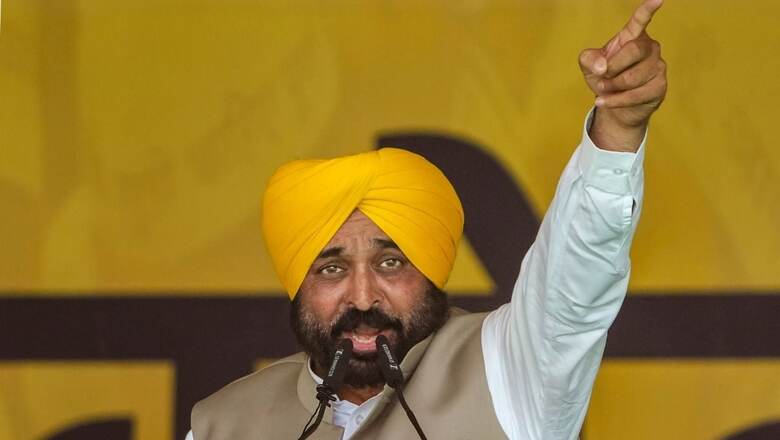
views
It may sound a bit rich that the Punjab Industrial and Business Development Policy 2022 aims to transform the state-industrial sector as an export hub. Unfortunately, the notification no. 4888, dated October 17, 2018, under the Punjab Industrial and Business Development Policy 2017, which excluded hundreds of industries having Inverted Duty Tax Structures and Export-Oriented Units from incentives on Fixed Capital Investment(FCI), has been repeated and presented as annexure-A with clause no. 12.26 in the new industrial policy also. Thus, the whole exercise to frame and notify the new industrial policy dilutes the purpose of fetching new investment in the state, which needs to be revisited and the error to be corrected in the said clause of the new industrial policy.
The repeated error of the previous policy, once again, has been embodied in the new industrial policy stating that the incentive shall exclude any refunds entitled to be obtained by the taxpayer for any reason including on exports, or deemed exports. It narrates that any refund from the Central government is to be adjusted against the payment of state incentives, which principally deprived the right of the industry falls under the Inverted Duty Tax structure under which excessive amounts of tax are being paid on inputs and the same is refundable legally. Therefore, it is not justified to adjust the Central government refund against the payment of state incentives.
Suppose any industry that pays 18 per cent GST on input raw material and is liable to pay 12 per cent GST on the final product, falls under Inverted Duty Tax Structures and is entitled to avail the input tax credit from the government. The Export-Oriented Units, also entitled to a full refund of input GST from the government, are being deprived of the state incentives because of the operation of this corrosive clause.
The big question is how a state government can restrict incentives to industries having an inverted tax structure and export-oriented units entitled to get refunds. Even a single unit in Punjab, covered under an inverted duty structure, gets an incentive on FCI. Hence, the Punjab government cannot exclude these particular industries from incentives.
Against notification no. 4888 dated October 17, 2018, under the previous industrial policy, which is now hurting as Annexure-A with clause no. 12.26 in new policy, earlier the industries forwarded a representation to the chief minister on January 21, 2021. While an interface to this representation, the Policy Implementation Unit of the Department of Industries and Commerce forwarded memo no. 7736-7737 on April 23, 2021, to the taxation commissioner and GMs of the District Industries Centre (DIC). In this memo, the department admitted the error in the said notification and agreed to work out the minimal 2.5 per cent incentive on the FCI to the industries having an inverted duty tax structure and export-oriented units.
Instead of revisiting and correcting the unjustified objections in the previous policy, the same is being carried in the new industrial policy which excludes incentives to the industries. Since 2018, hundreds of applications have been pending to avail incentives under the previous as well as new industrial policy. Finally, the concerned accountable officials should understand that repeated error in policies never meets the purpose for the public good as well as for the economy.
To make the Punjab Industrial and Business Development Policy 2022 a big success, Punjab Chief Minister Bhagwant Mann has made all the right noises about creating a conducive environment for the industry but he needs to back it with prompt interventions on due incentives to the industries.
However, before framing the new industrial policy, the concerned officials organised various meetings of the chief minister with stakeholders to incorporate their feedback. Despite all the exercises, the differentiator is missing in the policy because the senior officials are adopting a lackadaisical approach towards the industries, that’s why the error is repeated again and again.
To strengthen and make an accountable and time-bound incentive system, there is a need to re-engineer the processes of core departments like Punjab Industries & Commerce, Taxation and Finance Department. On priority, it is needed to make the incentives extremely simple and industry-friendly and to minimise the complex riders at all levels of processing. Denial or delay in incentives could affect competition and consequently constrain economic growth.
At its current scale of operations, the Industry and Commerce Department integrated window system and unified regulator should be effectively applicable to incentives for all upcoming investment projects and existing industrial units in the state. Therefore, the officials should perform their intended roles effectively to meet the state’s emerging economic challenges and expectations.
The Way Forward
There is a pressing need for the Department of Industries and Commerce, Taxation and Finance to revisit Annexure-A, having clause no. 12.26 in the new industrial policy and correct the admitted error to work out the minimal 2.5 per cent incentive to industries having inverted duty tax structure and export-oriented units on fixed capital investment under the previous and new industrial policy.
At various levels, Punjab Industrial and Business Development Policy 2022 needs to envisage a simplified, time-bound and technology-driven incentives approval, with minimal human interface with due diligence, to nurture a competitive industrial ecosystem in the state as a job engine.
The author is Vice-Chairman of Sonalika group, Vice-Chairman (Cabinet minister rank) of Punjab Economic Policy and Planning Board. Views expressed in the above piece are personal and solely that of the author. They do not necessarily reflect News18’s views.




















Comments
0 comment